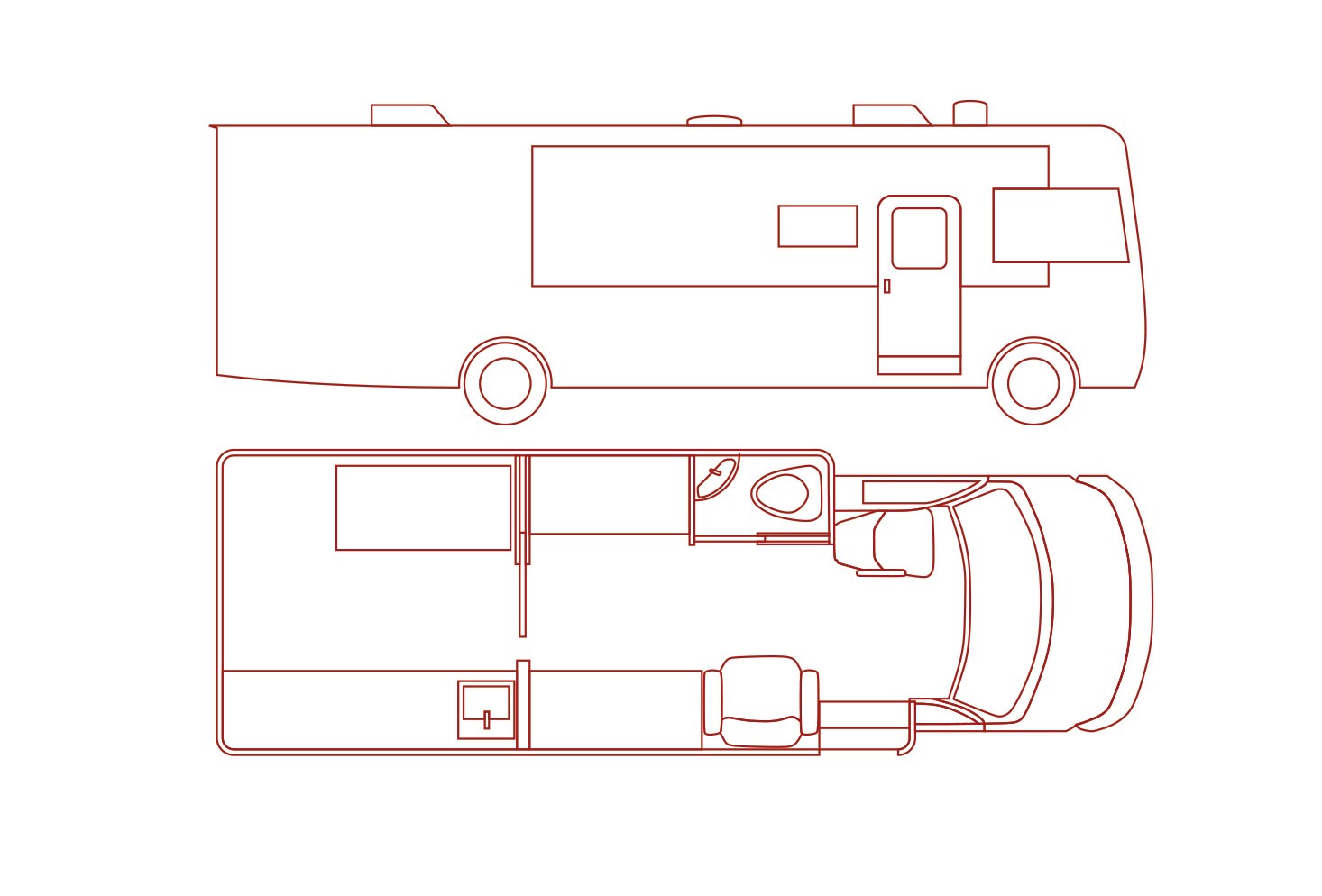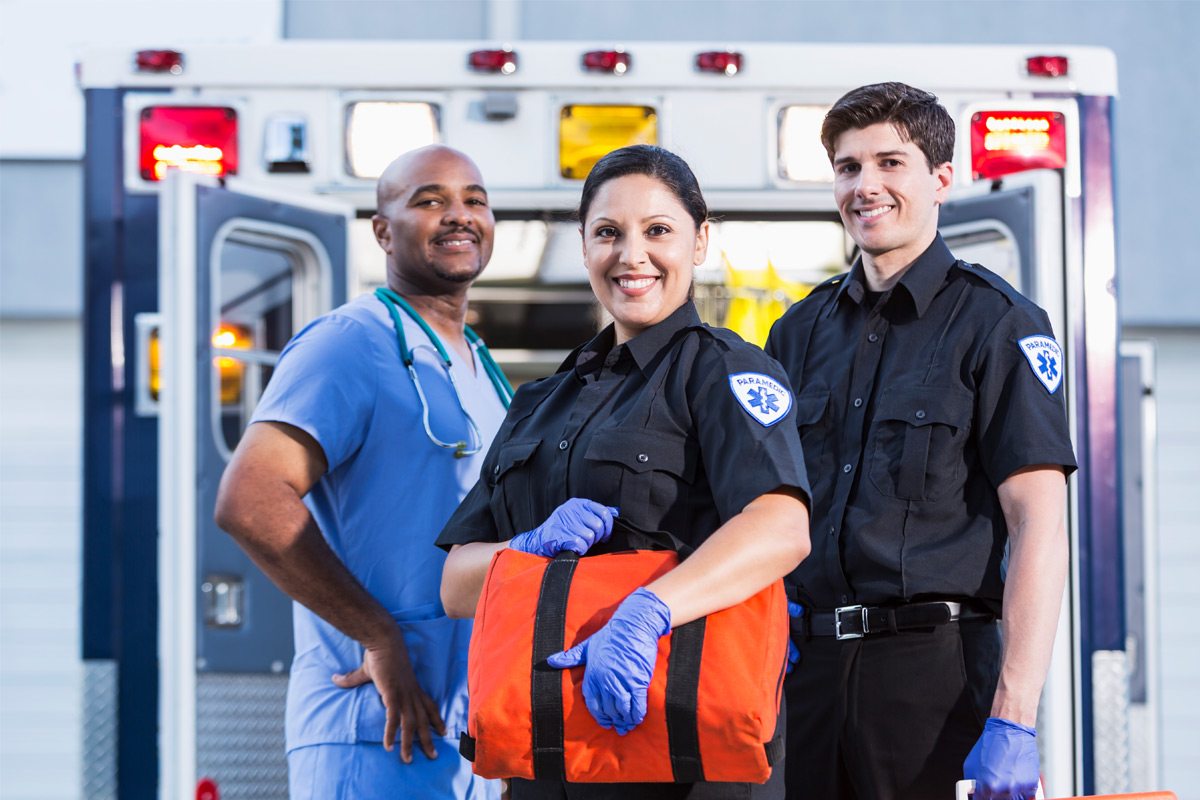︎ Traveling Clinic for First Responders
First Responders and Medical - Field Workers are facing extremely difficult and stressful
circumstances at work. Their jobs and training often force them to put their health needs
aside for others. Our mobile clinic uses an app to highlight appointment requests by
both employees and employers on a heat map. A mobile home being utilized as a
mobile clinic/pop-up clinic then travels to these essential workers at their job to offer
them an outside source of healthcare and accessible primary care that puts their own
needs on the forefront of their lives.
By Aaron Comstock ︎, Ann Borek︎
Why
Across the globe, especially after the Covid-19 pandemic, first responders and medical-field workers are suffering. These heroes endured extensive pressure from their jobs with little to no increased benefit. They have experienced unprecedented amounts of stress from increased patient loads, to lack of fellow employees, to the mental trauma that comes with being on the front-line during a pandemic. Over 100+ first responders commit suicide a year, more than are killed in the line of duty (NFPA). To further validate that there is a mental health problem amongst these workers, a survey conducted by PLOS ONE found that over 58% of healthcare workers don’t feel engaged or useful (Plos One). In addition to the mental stress, there is also a physical component to this health crisis. These professionals face extreme expectations while having to put their own health aside for their patients. With these alarming numbers and their importance as every-day life-savers, something needs to be done. The goal of this intervention is to take stressed, unhealthy essential workers who ignore their own health concerns and push their needs aside to develop a physically and mentally healthier essential work force that allows for more effective job performance, less worker turnover, and more lives saved. The more we can take care of these essential workers, the more they can save lives, continue to do their jobs with maximum efficiency, and be there when we inevitably need them.



How
In order to care for essential workers, we are proposing a mobile clinic, housed in a traveling bus, as well as in pop-up events that inhabit places around the community. This will allow essential workers to be met with care at their workplace, without hindering their job. Individual appointments can be scheduled through an app, as well as periodic workplace-wide events.


In order to accomplish this goal of caring for the physical and mental health of essential workers we’ve looked at two non-traditional health care systems that utilize convenience, mobility, and event based community building. Retail clinics such as the CVS minute clinic offer a quality check up in a convenient place, whereas a mobile health system such as the Red Cross create a strong event based model that engages entire communities.
So What
The mobile clinic with pop-up events for first responders and medical-field workers will have a vital impact on the patients who utilize it. The intervention will allow for more of these professionals to have confidential and accessible health care. Regardless of where they work or what shift. Managers can also use this as a way to get employee physicals completed. This gives them a reason to support this financially. This impact could result in a healthier essential work force and healthier people. It benefits the patients of these workers, the workers themselves, and the companies they work for.
Design To Outcomes
In order to put first responders first, we are proposing to create a moblle clinic. This will entail two physcial foorprints, the first being a traveling vehicle, the second being larger scale pop-up clinics set up in the first responder’s work places.
This service will travel to first responder’s in the community. In order to know which individual or area are in need of service, there will be a mobile app/website. The app will allow first responder’s to request individual appointments. If an individual appointment it requested the mobile vehicle will come to the individual’s workplace and provide physical and mental health care for that individual.
On the app the mobile physicans will be able to see the proximity of all of the appointment’s requested through a “heat map”, and provide the most convienent and time efficient care.
In addition to requested appointments, the mobile clinic will drive throughout the community and perform drop-in appointment to workplaces that may need them.
The last component of the mobile clinic will be larger pop-up events hosted throughout the community. These events will be scheduled in advance and advertised in order to create a sense of community around the health of first responders, helping to bolster their mental and physical health.

Links to Follow:
︎︎︎Two Page Report
︎︎︎Miro Board
︎
Works Cited
American College of Emergency Physicians, March 19, 2021.
https://www.acep.org/tacticalem/newsroom/mar2021/2020-law-enforcement-officer-line-
of-duty-deaths--the-impact-of-covid-19/.
Cambell, Richard, and Ben Evarts. “United States Firefighter Injuries in 2020.” nfpa.org. target="_blank">nfpa.org. NFPA,
December 2021.
https://www.nfpa.org/-/media/Files/News-and-Research/Fire-statistics-and-reports/Emerg
ency-responders/osFireServiceTrendTables.pdf.
Cherry, Donald, Michael Albert, and Linda McCaig. “Products - Data Briefs - Number 311 -
June 2018.” Centers for Disease Control and Prevention. Centers for Disease Control and
Prevention, November 6, 2015. https://www.cdc.gov/nchs/products/databriefs/db311.
Fahy, Rita, and Jay Petrillo. “News & Research.” NFPA, August 2022.
https://www.nfpa.org/News-and-Research. target="_blank">https://www.nfpa.org/News-and-Research.
Fahy, Rita, and Joseph Molis. “Firefighter Fatalities in the US - 2018.” nfpa.org. NFPA, June
2019. https://www.nfpa.org/News-and-Research.
Grüter, Roman, Tim Trachsel, Patrick Laube, and Isabel Jaisli. “Expected Global Suitability of
Coffee, Cashew and Avocado Due to Climate Change.” PLOS ONE. Public Library of
Science, March 10, 2022.
https://journals.plos.org/plosone/article?id=10.1371%2Fjournal.pone.0261976.
“Help for First Responders Struggling with Drug Abuse or Mental Illness.” Live Another Day,
September 1, 2022. https://liveanotherday.org/resources/first-responders/.
“How Hosting a Blood Drive Works.” How To Plan A Blood Drive | Red Cross Blood Services.
Red Cross. Accessed December 13, 2022.
https://www.redcrossblood.org/hosting-a-blood-drive/learn-about-hosting/how-hosting-a-
blood-drive-works.html.
“The Increasing Cost of Health Care.” U.S. Bureau of Labor Statistics. U.S. Bureau of Labor
Statistics, November 2009. https://www.bls.gov/spotlight/2009/health_care/.
Inman, Author: Katie. “Project Rural Recovery Rolls Out Mobile Health Clinics to Help Rural
Communities with Medical Needs.” wbir.com. WBIR, October 27, 2020.
https://www.wbir.com/article/news/health/project-rural-recovery-rolls-out-mobile-health-
clinics-to-help-rural-communities-with-medical-needs/51-8ffbd5b5-0e75-47d5-9946-3f4
422cf7889.
Julia, Nina. “Post-Traumatic Stress Disorder (PTSD) Statistics: 2022 Update.” CFAH, October
29, 2022. https://cfah.org/ptsd-statistics/.
Kambhampati, Anita, Alissa O’Halloran, and Michael Whitaker. “Covid-19–Associated
Hospitalizations among Health Care Personnel - Covid-Net, 13 States, March 1–May 31,
2020.” Centers for Disease Control and Prevention. Centers for Disease Control and
Prevention, October 29, 2020.
https://www.cdc.gov/mmwr/volumes/69/wr/mm6943e3.htm.
Kennedy-Hansen, Dr. Holly. “First Responder Mental Health and Wellness: Kaiser Permanente.”
Business Health Care | Choose Better | Kaiser Permanente ®, November 18, 2020.
https://business.kaiserpermanente.org/insights/mental-health-workplace/first-responder-s
upport.
McCarthy, Niall, and Felix Richter. “Infographic: The Pandemic's Devastating Impact on
Healthcare Workers.” Statista Infographics, January 5, 2021.
https://www.statista.com/chart/23847/healthcare-worker-deaths-in-the-pandemic-by-occu
pation/.
“National Safety Month: Workplace Fatalities and Injuries.” HSI, June 2021.
https://hsi.com/blog/national-safety-month-workplace-fatalities-and-injuries.
Nguyen, Jason. “Weight of the Call: First Responders May Not Be Taking Care of Themselves
during the COVID-19 Pandemic.” ABC4 Utah. ABC4 Utah, August 12, 2020.
https://www.abc4.com/news/weight-of-the-call-first-responders-may-not-be-taking-care-
of-themselves-during-the-covid-19-pandemic/.
William H. Shrank, MD. “Quality of Care at Retail Clinics for 3 Common Conditions.” AJMC.
MJH Life Sciences, October 15, 2014.
https://www.ajmc.com/view/quality-of-care-at-retail-clinics-for--3-common-conditions.